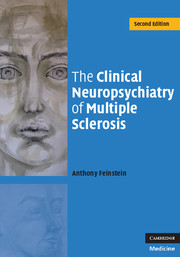Book contents
- Frontmatter
- Contents
- Acknowledgement
- Foreword
- 1 Multiple sclerosis: diagnosis and definitions
- 2 Depression: prevalence, symptoms, diagnosis and clinical correlates
- 3 Depression: etiology and treatment
- 4 Multiple sclerosis, bipolar affective disorder and euphoria
- 5 Multiple sclerosis and pseudobulbar affect
- 6 Multiple sclerosis and psychosis
- 7 Cognitive impairment in multiple sclerosis
- 8 The natural history of cognitive change in multiple sclerosis
- 9 Cognitive impairment in multiple sclerosis: detection, management and significance
- 10 Neuroimaging correlates of cognitive dysfunction
- 11 Multiple sclerosis, disease-modifying treatments and behavioral change
- 12 Multiple sclerosis: a subcortical, white matter dementia?
- Index
- Plate section
- References
9 - Cognitive impairment in multiple sclerosis: detection, management and significance
Published online by Cambridge University Press: 13 August 2009
- Frontmatter
- Contents
- Acknowledgement
- Foreword
- 1 Multiple sclerosis: diagnosis and definitions
- 2 Depression: prevalence, symptoms, diagnosis and clinical correlates
- 3 Depression: etiology and treatment
- 4 Multiple sclerosis, bipolar affective disorder and euphoria
- 5 Multiple sclerosis and pseudobulbar affect
- 6 Multiple sclerosis and psychosis
- 7 Cognitive impairment in multiple sclerosis
- 8 The natural history of cognitive change in multiple sclerosis
- 9 Cognitive impairment in multiple sclerosis: detection, management and significance
- 10 Neuroimaging correlates of cognitive dysfunction
- 11 Multiple sclerosis, disease-modifying treatments and behavioral change
- 12 Multiple sclerosis: a subcortical, white matter dementia?
- Index
- Plate section
- References
Summary
With the recognition that cognitive impairment affects approximately 40% of patients with MS, new challenges have presented themselves. Among them is a need to detect cognitive abnormalities accurately in a time-efficient, cost-effective way. Almost one in two patients with cognitive dysfunction will be missed during the routine neurological examination, indicating that neurological impairment is not a reliable predictor of deficits (Peyser et al., 1980). While there is no alternative to neuropsychological testing in this regard, the procedure is time consuming, expensive and may not be readily available in many centers.
This has prompted a search for a brief, reliable and easy to score method for eliciting deficits that may also lend itself to repeat testing for documenting cognitive change over time. As a result, the efficacy of existing cognitive screening procedures, such as the Mini-Mental State Examination (MMSE; Folstein et al., 1975), have been assessed in patients with MS, while efforts at developing new measures specifically targeting this population continue. This chapter will critically review progress to date. A discussion on treatment options for the compromised patient will follow and the chapter will conclude with a brief overview of studies that reveal the real-world challenges faced by cognitively impaired MS patients.
When discussing the possibility of cognitive decline with MS patients, considerable tact is required. Many patients are young and may still be working. Many are in the process of coming to terms either with the diagnosis of MS and the loss of some neurological function.
- Type
- Chapter
- Information
- The Clinical Neuropsychiatry of Multiple Sclerosis , pp. 155 - 177Publisher: Cambridge University PressPrint publication year: 2007



